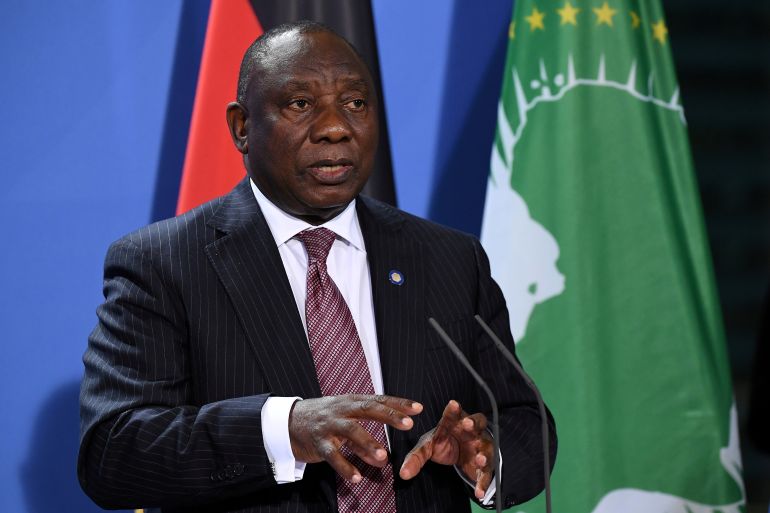Climate justice coalition files criminal complaint against South Africa
In recent years, the weather patterns in South Africa’s coastal regions, including the Eastern Cape and KwaZulu Natal, have become increasingly erratic and unpredictable.

Johannesburg, South Africa – A group of climate change organisations have filed criminal complaints against the South African President Cyril Ramaphosa, and a number of prominent cabinet ministers, accusing the government officials of “unlawful negligence” by failing to take “practical action to address the climate crisis.”
The move comes as nearly 400 people have been reported dead in KwaZulu Natal province, where a subtropical storm, Issa, also destroyed buildings, highways and infrastructure.
In documents submitted to the South African Police Services on Thursday, the Climate Justice Charter Movement (CJCM) wants the government to be found guilty of “culpable homicide” for its acts of omission to “prevent further emissions and to protect the vulnerable from increased inequality and poverty.”
CJCM, a coalition of several climate change activists and lobby groups from across the country, is arguing that the South African government is directly responsible for the deaths in KwaZulu Natal.
“We filed a criminal complaint in order to test the strength of our criminal justice system and our democracy,” said Vishwas Satgar, the board chairperson of Co-operative and Policy Alternative Centre, a member of the CJCM alliance. “It is the cheaper route than a civil case, and we have galvanised support from legal persons all over the country who agree that it is time to link the climate crisis to the rule of the justice system.”
The provincial government estimates that the damage amounts to billions, and has declared a State of Disaster, in order “to release funding to flood-affected communities”.
While visiting affected families in the flood-stricken region on Wednesday, President Cyril Ramaphosa blamed the heavy rainfall on the climate crisis, and said, “We can no longer postpone what we need to do, and the measures we need to take in order to deal with climate change.”
In November 2021, he secured a historic $8.5bn pledge at the United Nations Climate Change Conference (COP26) from the governments of the United States, the United Kingdom, France, and others to support South Africa’s transition to a low carbon economy.
But CJCM is saying that the government has been all talk and little action for almost three decades and “is fully aware of the urgency around the climate crisis but it is failing to take any action”.
Satgar insisted that the government has made little effort in fashioning a practical response to the climate crisis since the COP26 development and has no climate change strategy and “There is no concrete legislation being introduced,” he told Al Jazeera. “In this context, South Africa will continue to be vulnerable to the effects of climate change.”
During the years, the weather patterns in South Africa’s coastal regions, including the Eastern Cape and KwaZulu Natal, have become increasingly erratic and unpredictable.
In 2019, both regions experienced severe droughts that destroyed crop farms. In the same year, floods killed more than 80 people in the same regions. This January, another devastating storm hit KwaZulu Natal killing 25 people.
According to the climate change coalition, they have made many unsuccessful attempts since 2018 to engage with the South African government about the urgency of climate change action.
“The government has known about the urgency of building climate resilience in infrastructure and centralising the climate emergency for decades and has done very little about it,” said Janet Solomon, an activist with Oceans Not Oil, a member of the coalition.
“By charging the government with culpable homicide, we’re saying this disaster is an issue of maladministration and criminal negligence. People are dying,” she added.
In a statement sent to Al Jazeera, the premier of KwaZulu Natal, Sihle Zikalala, who is also named in the documents, did not respond to specific questions about the filed complaints.
But he said “Both the timing and the severity of the flood disaster clearly suggest that we live in times of ecological imbalance linked to climate change and environmental degradation.”
Zikalala added that the government was “working hard to mitigate the impact”.